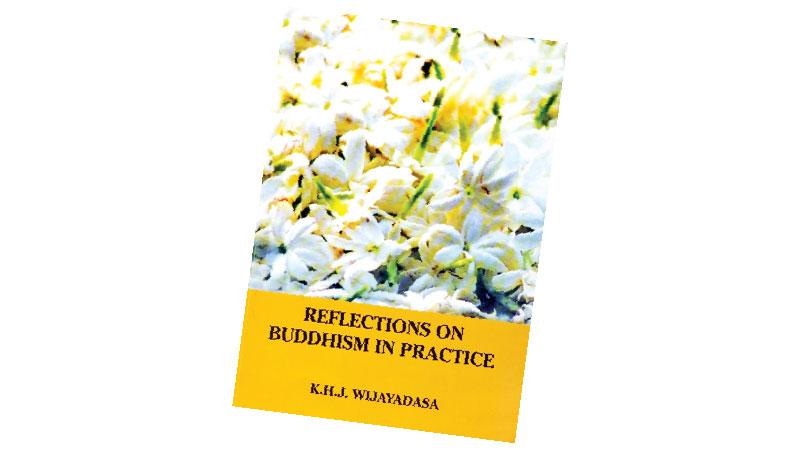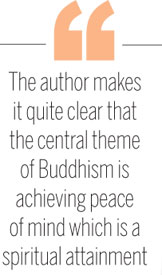
Reflections on Buddhism in Practice
Author: K.H.J. Wijayadasa
Pages: 94
Publisher: Government Service Buddhist Association
 “Do not believe in anything because you have heard it, or because it has been handed down for many generations or because it is found in your religious books or on the authority of your teachers and elders, but, after observation and analysis, when you find it agrees with reason and is conducive to the good and benefit of one and all, then accept it and live up to it.”
“Do not believe in anything because you have heard it, or because it has been handed down for many generations or because it is found in your religious books or on the authority of your teachers and elders, but, after observation and analysis, when you find it agrees with reason and is conducive to the good and benefit of one and all, then accept it and live up to it.”
Supremely Enlightened Buddha in Anguttara Nikaya. Kalama Sutta.
Today, in the 21st century, we inhabit a world of thought, which we tend to think is unparalleled in the whole of human history for upholding a pragmatic, critical and questioning attitude, towards all form of philosophies, religious systems and even towards cults and credos, generally considered ‘sacred’.
But 2,600 years ago the compassionate Buddha in his classic Kalama Sutta spelt out the perennial formula for a pragmatic and critical approach towards any system of thought or philosophy, anywhere or any time in human history.
Though we in Sri Lanka as custodians of Theravada Buddhism have inherited that wholesome questioning state of mind, in today’s context many Buddhists have converted that pragmatic attitude into a ‘cultish’ set up. Instead of practising the culture of the mind advocated by the supremely Enlightened Buddha, as the only way to Moksha – ultimate liberation – many resort to rites and rituals to achieve realisation.
In an anthology of essays titled, ‘Reflections on Buddhism in practice’ that puts together 10 very thoughtful pieces of writing within its covers, the experienced State Administrator, dedicated Buddhist and exceptionally impressive writer - K.H.J. Wijayadasa, takes up (among other issues) a central preoccupation of many advanced Buddhists of our time. This core concern is, of course, the troubling neglect of a multitude of Buddhists who relegate the practice of the teachings of the Buddha to a secondary and less significant position, while assigning an exacted niche to the performance of rites and rituals.
At the outset itself the author makes it quite clear that the central theme of Buddhism is achieving peace of mind which is a spiritual attainment rather than the outcome of a series of external rites and rituals.
The opening essay of the anthology is titled ‘Distinctive Features Inherent in Buddhism’. At the outset itself the Author points out that modern man living in an age of science is inclined to accept the truth of anything by observation and experiment rather than by mere belief.
The implication of this statement is that men and women of our time have taken up the attitude of ‘intelligent questioning’, long after the supremely Enlightened Buddha admonished mankind of the essential need for wise enquiry, eschewing irrational and mechanical faith and belief.
As the initial essay progresses, the writer strengthens the view that the essence of the Buddha’s Teaching is freedom of thought and action.
In a tersely argued presentation of his views, the author emphasises the investigative spirits that enliven the Buddha’s dispensation.
This attitude of free enquiry, pervading the totality of the Buddha’s Teaching enables the adherent to reach self-discovery, and true enlightenment without any need whatsoever for complicated rites and rituals that dominate many other faiths. He builds up his thesis to conclude his finding in this manner’. ‘Buddhism is the only great religion of the world that is consciously and frankly based on a systematic and rational analysis of problems of life; leading to the way of their solution.
As the Anthology proceeds, the author takes a look at some of the views that are associated with the practice of Buddhism.
In a form of response to some of those persons who may feel that Buddhism does not seem ‘scientific’ in the contemporary sense the author quotes the science-rishi Albert Einstein, who is accepted by almost all as the Greatest Scientist of the 20th century. These are the words of Albert Einstein: “If there is any religion that would cope with modern scientific needs, it would be Buddhism.” The generally held view of the modern scientific community of the world is that, it is only the timeless Dispensation of the Supremely Enlightened Buddha that can continue to hold its own, without being outdated by whatever may be the latest findings in the field of theoretical science.
Standing on the solid ground of logical truth, the author makes out that the Buddha Thought has surpassed modern secular science. This is how he goes about it: “Science works on the basis that nature fixes laws. But on the other hand, Buddhism strives to solve the problem of human suffering which arises from both internal or mental and external or physical conditions with an emphasis on human behaviour. At the same time, Buddhism sees this as a natural process. Thus Buddhism has faith in nature as well as in human beings.”
In the chapters that bear the titles “Buddhism as a Catalyst of World Peace” and “Buddhism and Sustainable Development”, the author applies Buddhist thought to the solution of two crucial problems that haunts modern man. The two areas focused on are, Peace and Sustainable Development.
With all the deadly weaponry modern man has ‘created’, investing multi-billions, peace remains elusive. Man killing man has now turned out to be an entrenched ‘habit’ of today’s human society. ‘Violence’, pathetically, has taken over as an ‘idiom’ of inter-human relations. The author clearly articulates the stark truth that men’s alienation from peace has come about as a tragic outcome of man’s disregard for the salient features of Buddhism among which are fellowship, amity, and peaceful coexistence. The author highlights peace education as a vital ingredient in the creation of a peace-loving society.
The author notes a startling contribution made by the Supremely Enlightened Buddha towards Sustainable Development. Today, the human community is preoccupied mainly with human rights. But as the author quite interestingly reminds the readers, the Buddha was the first Religious Teacher of mankind to draw our attention to rights of all living beings. If this noble view of life is held in high esteem, we will be able to produce a formula of sustainable development, embracing the totality of life.
The author finds that the universally accepted Sustainable Development models have not been able to register the intended impact because it overlooked the spiritual dimension of Sustainable Development. In consequence, Sustainable Development has not been able to yield the expected results. The spiritual dimension focused by Buddhism will provide the proper answer.
The Anthology presents three essays, the titles of which are, ‘The Position of Women in Buddhism’, ‘The Saga of Asoka the Wicked Transferred into Asoka the Righteous”, “Sir Don Baron Jayatillake – The Epoch Maker”, “Conservation and Restoration of Anuradhapura Jaya Sri Mahabodhi Shrine”, “Managerial Tasks in the Preservation and Popularization of Heritage” and “The Way Forward for Buddhism in the 21st century”.
The Anthology taken as a whole is a highly valuable contribution to the country’s public discourse.
Today, the helpless masses have no option but to be overwhelmed by those raucous expressions of views of those who dominate the public stages and mass media (both print and electronic).
They fill the minds of innocent folks with their effusions that mar the peace and serenity of the minds of those helpless participants.
In such a troubling context, a work like K.H.J. Wijayadasa’s “Reflections on Buddhism in Practice”, is a welcome shower in a sandy desert.
In his end-remark, the author observes:
“We can conclude that the middle way is the most appropriate Buddhist way which is applicable to every aspect of life and society”.
K.H.J. Wijayadasa’s Anthology spurs on enquiry, leads to new attitudes and is quite thought provoking. We need this kind of effort to prod our people awake.
